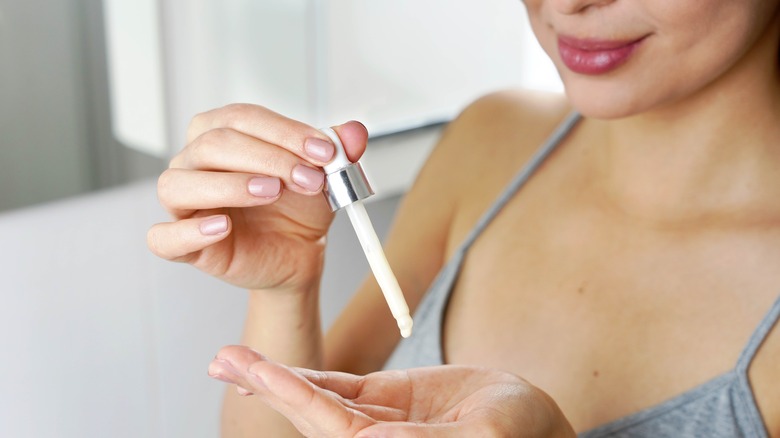Dermatologist Shares Health-Promoting Skincare Tips To Start In Your Twenties
It's easy to assume that skincare isn't something to concern ourselves with until later in life. However, board-certified cosmetic dermatologist Dr. Michele Green makes the case for starting a healthy skincare routine early on.
"Signs of aging begin to appear in your twenties as the skin's collagen production decreases," Dr. Green explains. She states that sun exposure is often one of the biggest culprits behind skin damage. "The sun's ultraviolet rays penetrate the skin to the deepest layers and cause cellular changes that contribute to not only skin cancer but also premature signs of aging," she says. "These signs of aging include brown spots, wrinkles, fine lines, skin laxity, loss of elasticity, and uneven skin texture and tone."
For this reason, Dr. Green tells us her first tip is to wear sunscreen on a daily basis starting in your twenties. "Sunscreens should contain an SPF of at least 30 for adequate protection and should be reapplied every 90 minutes or after getting out of the water or sweating," she explains. "The sunscreen should also be 'broad-spectrum,' which means it adequately protects against both UVA and UVB rays." Don't let cloudy days fool you either, Dr. Green points out, stating that sunscreen use is just as important on overcast days as it is on sunny days.
"Wearing sun-protective clothing, such as an umbrella [or a] wide-brimmed hat, along with applying sunscreen, is best," she adds. "Avoid laying out in the sun for a long time without protection, along with tanning beds."
The importance of vitamin C and retinol
Dr. Green goes on to share her second skincare tip for people in their twenties: plenty of vitamin C. "Vitamin C is a popular skincare ingredient that is an antioxidant which protects the skin from damage from free radicals and oxidative stress," she states. "Free radicals are unstable atoms that can break down the skin's collagen and damage skin cells, and oxidative stress refers to a condition in which there are too many free radicals and not enough antioxidants to get rid of them," Dr. Green explains. "Vitamin C then acts as a protector for the skin by neutralizing free radicals caused by UV radiation and environmental pollution." She points out that vitamin C also has the added benefits of promoting skin cell regeneration and collagen production, thereby enhancing the health of skin's texture and tone.
Another ingredient to be on the lookout for is retinol. "Retinol is a proven anti-aging ingredient that is a vitamin A derivative, and it works by accelerating skin cell turnover and stimulating new collagen synthesis," Dr. Green explains. "By using retinol, dead skin cells are removed at a faster rate, making way for healthy skin cells that are more even in tone and texture," she says. "The increased collagen production also provides the skin with structural support for a firm and more youthful appearance." However, because retinol can increase our skin's sensitivity to the sun's rays, Dr. Green emphasizes that it is best used at night.
Don't skip makeup removal, and avoid overdoing it with skincare products
"Be sure to remove all of your makeup at the end of the day, and be diligent about cleansing the skin using the appropriate cleanser for you," Dr. Green says, offering her next tip. "Sleeping with makeup on can cause clogged pores and trap oil, dirt, and makeup in the skin, causing acne breakouts and bacteria buildup," she explains. And you may want to go for the old tried-and-true method of soap and water over makeup remover wipes, she adds.
If you've been using the same cleanser for years, you may also want to reevaluate if it's doing your skin any favors. "Our skin and bodies change with age, and your skin may not need the harsh, exfoliating cleansers you used to use as a teenager with acne-prone skin," Dr. Green states. "If your skin feels drier with age, opt for a gentle cleanser instead."
"Although early intervention and prevention are important in anti-aging and maintaining skin health, it is important to listen to your skin's reaction and not overdo certain skincare products," Dr. Green cautions. "Retinol and exfoliants like AHAs and BHAs can irritate the skin if overused and cause more harm than good." Rather, Dr. Green encourages individuals to ease into the use of new products. "With any new skincare products, especially if you have sensitive skin, it is always recommended to introduce them slowly, one at a time," she says. "Start by using it every three days and gradually increase the frequency of use as long as your skin can tolerate it."
Why you should start now
Why implement these tips sooner rather than later? "The skincare habits that we develop in our 20s set the foundation for the future of our skin, and it is never too early to take proper care of our skin," Dr. Green states.
"The rate of collagen production in the skin declines with age, starting in our 20s," she says, adding that lifestyle habits can accelerate this decline. "The aging process is exacerbated by sun exposure, along with lifestyle habits like lack of sleep, smoking, and excessive drinking." When it comes to sun exposure in particular, those in certain lines of work may be more susceptible to skin damage. "There are plenty of clinical studies that show the effect of sun exposure on the skin and the aging process," Dr. Green states. "This is also visible in truck drivers, where the left side of the face, frequently exposed to the sun through the window, looks significantly older than the right side, which remains shaded and protected by the vehicle."
Dr. Green points out that certain preventative treatments such as a Thermage RF skin-tightening procedure and preventative Botox may also help keep early signs of aging at bay. However, just implementing a few of these preventative tips can also yield results. "Someone who diligently uses sunscreen, wears sun-protective clothing, does not sunbathe or use tanning beds, and uses anti-aging skincare ingredients in their 20s will likely have a more youthful appearance," Dr. Green concludes.



